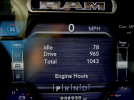mmondich
Member
- Joined
- Feb 14, 2021
- Messages
- 9
- Reaction score
- 6
- Points
- 3
- Age
- 46
2021 Ram 1500 5.7HEMI eTorque. Has anyone has run 87 octane and noticed a significant change when switching to a higher octane? I know the manual says no lower than 89 but other than MPG potentially being impacted, I don't have any issues. Would possibly spend the extra $$ if I knew it would yield higher MPG's. Thanks.












